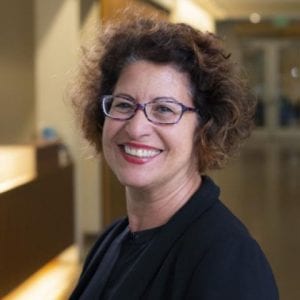5 Questions With UC Davis MBA Admissions Senior Director Andrea Shaw

In our latest installment of the MetroMBA “5 Questions” series, we speak with Andrea Shaw, Senior Director of Admissions at the UC Davis Graduate School of Management. Shaw discusses the tight-knit culture of the UC Davis MBA program, what students can expect, and what qualities define the program.
How does UC Davis help MBA applicants who don’t come from a traditional business or quantitative background?
“Students come to us from across industries, functions, and from around the world. We pride ourselves on being a tight-knit and collaborative community where conversations directly happen between faculty, staff, and students. Our curriculum also allows students to choose between many different career paths especially given the connections we have across other UC Davis schools.
For students coming from a non-business background or who are nervous about starting, we’re a school that really fits. Many schools have 600 students in a full-time program. We only have 50 students. That allows us to personalize the journey of each student.
Also, UC Davis doesn’t believe in just throwing our students into the program. We get to know our students and their needs—what they’re looking for, their strengths, weaknesses, etc. Part of that knowledge comes from our highly robust orientation where we spend almost a month before school starts to really engage with our students.

Andrea Shaw, Senior Director of UC Davis Graduate School of Management Admissions
During orientation, we spend a tremendous amount of time learning about our MBA class. There’s a significant career focus with discussion topics focused on networking, resume building, LinkedIn, etc. However, what the orientation is most known for is helping our students understand their emotional intelligence and develop their story through exercises and experiential learning.
Students have said in surveys that it’s the orientation that solidifies that they’ve made the right decision to come here. Those first few weeks are critical for setting them up for success.”
What type of culture defines UC Davis?
“The two words that continually come up from students, alumni, and faculty are “kind and compassionate.” We are driven toward success, but nice. It’s the idea of compassionate leadership, which research has shown to be necessary for true business growth. We even have an entire series that students can take to develop these skills, including awareness of themselves and others. Kindness and compassion are woven into every aspect of our culture, starting at the top with our dean.
Our culture is also defined by our location in a college town instead of a city. I love Davis as a city, community, and a place to go to college. It’s safe, comfortable, and all the energy revolves around the college.
We’re also really focused on what we do best as a university—biotechnology, sustainability, agriculture. Those sorts of segments and industries are very tied to our culture, university, and research. So, someone interested in Wall Street finance might not fit as well as someone interested in biotech.
Finally, because we’re a small community, you can really stand out. There are not a lot of politics to hold you back. You can get very involved, and there are fewer people vying for the same positions, so you can do as much as you want. This is highly beneficial for students who have a particular passion that they want to explore. For example, I know an MBA student who started a Women in Leadership organization because that was something she was passionate about, and it happened in a few conversations.”
Can you describe the qualities that UC Davis students possess?
“Other than the typical GMAT scores, GPA, and years of work experience, we look for applicants who know what they want to do with their MBA. Candidates should have a focus for the post-MBA career while also remaining open-minded about new opportunities. After all, an MBA is meant to be a transformative experience.
We also look for highly competent individuals who are professional in their verbal and written communications with us. We pride ourselves on being able to find jobs for all our students, so there’s a benchmark we look for—well-rounded students that have many different qualities. Going back to this idea of collaborative and kind, we look for candidates who are good team players and who see the value of working in groups because we have a lot of group work.
Finally, we look holistically at the class and how everyone will learn from each other. We look for a diverse class with students from a wide variety of backgrounds and industries. Everyone should be unique while still representing the essential qualities we love: kindness, compassion, and collaboration.”
If you could give one piece of advice to an MBA applicant interested in UC Davis, what would it be?
“Confidence! So much of what MBAs lack is confidence. The problem is that if you don’t think you can succeed, you won’t.
When you fill out your application and come in for your interview, we want confidence. Confidence is doing your research (knowing UC Davis), knowing who you are, and knowing your story. It’s also about being authentic. All of that leads to being confident in who you are and what you want. That will come across with us; it will come across anywhere.

“Confidence! So much of what MBAs lack is confidence. The problem is that if you don’t think you can succeed, you won’t,” Shaw says.
Remember, first impressions matter. That’s where that confidence helps too. If you come into a situation confidently, those first impressions are strong.”
What is your favorite San Francisco-focused business blog/website?
“I would say for applicants who are looking at schools in the Davis area, Metro-Edge.org is an excellent website. This is a website for young professionals in the Sacramento area. You’ll find events, gatherings, news, and more. It’s really focused on change and responsibility, and that’s great.
I also have to give a little plug to all of our social media accounts. Follow us on LinkedIn, Twitter, and Facebook for the latest news and insights. We also have MBA Showcase days coming up on January 26, February 9, and Feb 23.”
What Is The Worst MBA Advice You Have Ever Heard?

The path to business school is paved with experts and know-nothing-know-it-alls alike—it’s just hard to tell the difference sometimes.
This is especially true when it comes to “dos” and “don’ts” of the trade. You’re bound to encounter confusing, conflicting, or just plain bad advice in any field but there’s something about business school that seems to attract meaningless jargon like flies to honey.
I spoke to Accepted’s Linda Abraham and North Star Admissions’ Karen Marks, two leading admissions counselors and bonafide MBA experts, about the eight worst pieces of advice most commonly doled out to MBAs-to-be.
“Tell them what they want to hear.”
“The admissions committee will see through it, the applicant will blend into the gray mass of applicants who are making the same mistake, and at competitive schools, will get dinged,” Abraham writes. “Telling schools what you think they want to hear means telling them what you don’t know, and it also means you’re not telling them what you want them to know.”
“If you are waitlisted, ignore the school’s directions and make a dramatic gesture to demonstrate your interest.”
According to Marks, “People … have been known to do everything from emailing the admissions office once a day (relatively benign, but inappropriate) to sending homemade gifts (creepy) to showing up in the admissions office and refusing to leave until they have spoken with the Dean. All of this backfires, it’s really important to listen to the school’s directions and express your interest in ways that underscore your ability to follow directions, and your understanding of the culture.”
“Change your career goals and personal story for each school.”
Marks explains, “Your goals and core narrative should remain constant, no matter what school you are applying to. Don’t tell Stanford that you want to work in micro-finance and Kellogg that you dream of marketing, just because you think it’s what they want to hear.”
Abraham recalls an interaction she had with “an applicant who came to us initially for Rejection Review.” This applicant was told by his consultant, a former Yale SOM adcom director, “she would have rejected him also because the applicant’s goal made no sense given his work experience, education and extra-curricular activities. He explained that his friends had told him to use the “hot” goal that year, so he used it in his application. Next year he applied with an authentic goal (and app) and was accepted to an M7 school.”
“You have no chance of getting into a top MBA program because you didn’t go to a top undergrad.”
Abraham couldn’t disagree more with this statement.
“If an applicant excelled at their local college, shows leadership, and has had an impactful career, and has a competitive test score, they have a chance at elite MBA programs,” she says.
“You have a 750-plus GMAT and a 3.9 GPA, you’re in anywhere.”
Both counselors call hogwash on this one.
“You can’t rest on academic laurels. Yes, those numbers are very attractive to top b-schools, but if they are combined with arrogance—forget it. Schools also want to see leadership and impact in their accepted students. So, if Super Student wasn’t a super employee or entrepreneur or campus community member, those stats do not guarantee acceptance at top MBA programs.”
“Your goals don’t really matter, because you’re likely to change them once at b-school.”
Abraham writes, “Yes, your goals are likely to change and schools know that, but they at least want you to start their program with direction and a goal they know they can help you achieve. Goals are a major component in fit at most top MBA programs. And if yours are vague or don’t match the strengths of your target schools, then you simply aren’t showing fit.”
“If you have a blind interview, you can wing it.”
“You can wing it. BUT you are unlikely to be as effective as the other applicants who prepare,” Abraham notes.
“They will have researched the school, know exactly why they want to attend this program, and mined their own experiences and achievements so they are ready to show they belong at the interviewing school and will contribute to the school’s student body and alumni network.”
“Oh, and they also have thoughtful questions to ask the interviewer.”
“You won’t get in if your numbers are below an arbitrary number, so don’t even bother applying.”
Abraham has worked with “multiple clients who had extremely low GMATs and GPAs, below 2.5 and below 600, who have been admitted to Wharton, Booth, HBS, etc. I also admitted applicants with weak numeric profiles to Tuck when I was the Associate Director of Admissions. (They had other stellar qualities).”
Abraham believes that “essays, personality, perspective and life experience are more important than numbers.” She adds, “Application reviews are comprehensive. One element is extremely unlikely to keep you out or carry you across the threshold of a dream MBA program.”
Philly Entrepreneurship MBA Programs and Centers

Even though it’s located in the shadow of New York City and on the opposite coast as San Francisco, Philadelphia is still a great city to plant entrepreneurial roots. With plenty of top-notch business schools in or around the City of Brotherly Love, MBAs in the region have every opportunity to reach start-up success.
In the Philadelphia metro, a number of business schools have dedicated research and resource centers made specifically for students wanting to learn more about entrepreneurship. How do Philly business schools support their budding entrepreneurs? Check out the list below to learn more.
MBA Programs in Philly That Don’t Require Work Experience

Not everyone comes from a traditional working background earns an MBA for the same reason. So, in the same ways that some MBA programs don’t require the GRE or GMAT score for their applications, some business schools are also willing to consider applicants with limited or no prior professional experience.
Business schools in the Philadelphia metro are no stranger to MBA programs that don’t require work experience. Continue reading…
Seatlle MBAs That Do Not Require Work Experience

Not everyone comes from a traditional working background earns an MBA for the same reason. So, in the same ways that some MBA programs don’t require the GRE or GMAT score for their applications, many business schools are also willing to consider applicants with limited or no prior professional experience.
In the Seattle Metro there is one MBA program where professional working experience is preferred, but not required—the full-time MBA program at The University of Washington Foster School of Business. Continue reading…
5 Tips to Improve Your Resume for Your MBA Application

Your resume is one of the most powerful tools you have when applying for an MBA program. Schools want to know what you have done in the past so that they have an idea of what you will bring to the table in the future. Continue reading…
